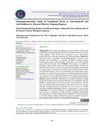1 citations,
January 2015 Walnut oil can be used in hair tonic to help hair growth.
182 citations,
November 2018 in “Cosmetics” Seaweeds have beneficial compounds for skin care, including anti-aging and protective effects.
 December 2022 in “International Research Journal Of Modernization In Engineering Technology And Science”
December 2022 in “International Research Journal Of Modernization In Engineering Technology And Science” Cosmeceuticals are special products that improve skin and hair health and have benefits like treating acne and wrinkles, protecting from the sun, and helping with dandruff and hair growth.
 13 citations,
January 2010 in “Advances in Biochemical Engineering / Biotechnology”
13 citations,
January 2010 in “Advances in Biochemical Engineering / Biotechnology” Understanding hair biology is key to developing better treatments for hair and scalp issues.
 August 2024 in “Saudi Journal of Medical and Pharmaceutical Sciences”
August 2024 in “Saudi Journal of Medical and Pharmaceutical Sciences” PRP combined with minoxidil is the most effective treatment for hair growth in androgenetic alopecia.
May 2020 in “Authorea (Authorea)” Olfactory receptors found outside the nose may offer new treatments for diseases like cancer and help in wound healing and hair growth.
 11 citations,
January 2012 in “International Journal of Trichology”
11 citations,
January 2012 in “International Journal of Trichology” Caffeine may help hair growth in hereditary hair loss.
 3 citations,
December 2022 in “npj Regenerative Medicine”
3 citations,
December 2022 in “npj Regenerative Medicine” HSPGs help control stem cell behavior, affecting hair growth and offering a target for hair loss treatments.
 January 2022 in “Clinical dermatology open access journal”
January 2022 in “Clinical dermatology open access journal” Certain cannabinoids may help increase hair growth and could be useful for treating hair loss.
 1 citations,
June 2023 in “Ethnobotany research and applications”
1 citations,
June 2023 in “Ethnobotany research and applications” The review concludes that the Ziziphus species, especially jujube, may promote hair growth and have various health benefits, warranting more research.
 December 2024 in “Research Journal of Pharmacy and Technology”
December 2024 in “Research Journal of Pharmacy and Technology” Seablite root extract may help prevent hair loss and promote hair growth.
 42 citations,
July 2015 in “Cosmetics”
42 citations,
July 2015 in “Cosmetics” Nanotechnology improves hair care products by enhancing ingredient stability, targeting treatment, and reducing side effects, but more research on its toxicity is needed.
 2 citations,
September 2009 in “Nurse Prescribing”
2 citations,
September 2009 in “Nurse Prescribing” PCOS affects many women, causing various symptoms and health risks, and is managed through lifestyle changes, medication, and support groups.
 9 citations,
January 1966 in “Economic botany”
9 citations,
January 1966 in “Economic botany” Plant-based ingredients in hair care are being replaced by synthetic alternatives.
 May 1993 in “Medical Clinics of North America”
May 1993 in “Medical Clinics of North America” Surgical hair replacement is a viable option for male pattern baldness when done with proper planning and realistic expectations.

A new system for classifying curly hair types using precise measurements can improve hair care products and cultural inclusion.
 January 2024 in “Seven Editora eBooks”
January 2024 in “Seven Editora eBooks” Different techniques measure hair properties to ensure cosmetic products work.
 5 citations,
May 2019 in “Journal of oceanology and limnology (Online)”
5 citations,
May 2019 in “Journal of oceanology and limnology (Online)” Ecklonia cava extract can reduce the damage and stress caused by hair dye.
 7 citations,
September 2020 in “Journal of Cosmetic Dermatology”
7 citations,
September 2020 in “Journal of Cosmetic Dermatology” Minoxidil and Finasteride are the most popular hair loss treatments, with rising interest in other options, and economic or health crises can change what treatments people prefer.
 May 2024 in “Journal of cosmetic dermatology”
May 2024 in “Journal of cosmetic dermatology” "Dutasteride 0.5 mg daily is the most effective treatment for male hair loss."
 5 citations,
January 2021 in “Skin appendage disorders”
5 citations,
January 2021 in “Skin appendage disorders” Smoking is linked to more hair loss and premature graying compared to nonsmokers.

Hormonal treatments can help with hair loss, acne, and excess hair growth, but it takes 3-6 months to see results and patients should know the possible side effects.
63 citations,
February 2017 in “ACS biomaterials science & engineering” Polydopamine is a safe, effective, and permanent hair dye that turns gray hair black in one hour.
 8 citations,
September 2020 in “Journal of Cosmetic Dermatology”
8 citations,
September 2020 in “Journal of Cosmetic Dermatology” More people are searching for hair transplants online, preferring Follicular Unit Excision over Follicular Unit Transplant. There's also a rise in female patients and interest in beard, eyebrow transplants, and non-surgical treatments like platelet rich plasma.
 179 citations,
September 1998 in “BMJ”
179 citations,
September 1998 in “BMJ” Hair loss in men is common, treatable, but not curable.
 January 2017 in “Clinical approaches and procedures in cosmetic dermatology”
January 2017 in “Clinical approaches and procedures in cosmetic dermatology” Cosmetic procedures can harm hair, but damage can be minimized with knowledge and care; however, once hair is damaged, it cannot be reliably repaired.
 3 citations,
January 2021 in “Wear”
3 citations,
January 2021 in “Wear” Hair's resistance to wear varies by ethnicity and treatment, with less wear indicating stronger hair.
 December 2017 in “Springer eBooks”
December 2017 in “Springer eBooks” Transplant patients often get skin problems, with treatments varying by condition.
 July 2024 in “Deleted Journal”
July 2024 in “Deleted Journal” The Ayurvedic program effectively manages hair loss due to iron deficiency anemia.
 October 2023 in “Jurnal Farmasi Galenika (Galenika Journal of Pharmacy)”
October 2023 in “Jurnal Farmasi Galenika (Galenika Journal of Pharmacy)” Traditional herbs in Amarasi District may help treat dandruff and hair loss.

























